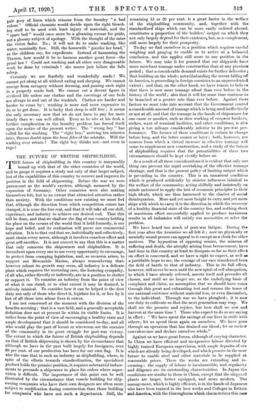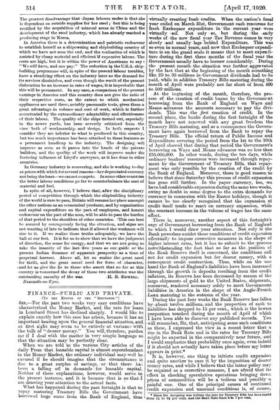THE FUTURE OF BRITISH SHIPBUILDING.
THE future of shipbuilding in this country is inseparably bound up with that of the other countries of the world, and to gauge it requires a study not only of that larger subject, but of the capabilities of this country to recover and improve its position in the field of shipowning. Before the war we were paramount as the world's carriers, although menaced by the expansion of Germany. Other countries were also making themselves felt, but to an extent that attracted attention rather than anxiety. With the conditions now existing we must feel that, although the direction from which competition comes has changed, it is none the less real, and that it will take all our skill, experience, and industry to achieve our desired end. That this will be done, and that we shall see the flag of our country holding the place on the oceans of the world that it held formerly, is our hope and belief, and its realization will prove our commercial salvation. It is to that end that we, individually and collectively, must strain every nerve, although it involves ceaseless effort and great self-sacrifice. It is not correct to say that this is a matter that only concerns the shipowners and shipbuilders. It is incumbent upon every one to use every opportunity to encourage, to protect from cramping legislation, and, as occasion arises, to support our Mercantile Marine, always remembering that, however robust its growth may seem, all industry is a delicate plant which requires the nurturing care, the fostering sympathy, of all who, either directly or indirectly, are in a position to shelter or support it. To examine an industry from the point of view of what it can stand, or to what extent it may be drained, is actively inimical. To consider how it can be helped is the first duty not only of those who direct it, legislate for it, or live by it but of all those into whose lives it enters.
I am not concerned at the moment with the division of the benefits accruing ; that is a vast field, and a generally acceptable definition does not at present lie within its visible limits. It is rather from the point of view of encouraging a healthy state and ample development that it should be considered to-day, and all who would play the part of locust or wireworm are the enemies of the community in its great struggle for post-war victory. The extent to which the future of British shipbuilding depends on that of British shipowning is shown by the circumstance that although we have in the past built largely for foreigners, over 80 per cent. of our production has been for our own flag. It is also the case that in such an industry as shipbuilding, where, in spite of the efforts towards standardization, the specialized product holds the premier position, it requires substantial induce- ments to persuade a shipowner to place his orders where super- vision is difficult. The importance of this point can be well illustrated by the circumstance that vessels building for ship- owning companies who have their own designers are often more subject to modification during construction than those building for companies` who have not such a department. Still, the
remaining 15 or 20 per cent is a great factor in the welfare of the shipbuilding community, and, together with the standardized ships which can be more easily ordered abroad. constitutes a proportion of the builders' output on which they not only largely depend for their existence, but, as a complement, still more largely for their prosperity.
To-day we find ourselves in a position which requires careful weighing and gauging to enable us to arrive at a balanced conclusion, and this applies still more to our position in the
future. We may take it for granted that our shipyards have more merchant tonnage under construction than at any previous
period ; that a considerable demand exists for further deliveries ; that building on the whole, notwithstanding the recent falling off in America, is proceeding in foreign countries to an unprecedented extent ; and that, on the other hand, we have reason to believe that there is now more tonnage afloat than ever before in the history of the world ; also that it will for some time continue to be launched at a greater rate than ever before. Against these factors we must take into account that the Government control a considerable amount of tonnage which is being used ineffectively or not at all, and that the tonnage in the hands of shipowners for one cause or another, such as slow working of cargo•or bunkers, strikes, want of terminal facilities, and other conditions, is also giving a ton mileage considerably inferior to its pre-war per- formance. The former of these conditions is certain to change before long, and the latter sooner or later ; both, however, are sources from which a virtual increase in effective tonnage will come to supplement new construction, and a study of the future of shipbuilding requires that the potentialities of these two circumstances should be kept vividly before us.
As a result of all these considerations it is evident that only one thing can prevent the rapid overtaking of the effective tonnage shortage, and that is the present policy of limiting output which is prevailing in the country. This is an unnatural condition which is produced artificially by sinister influences inimical to the welfare of the community, acting skilfully and insistently on minds untrained to apply the test of economic principles to their high ideals, which are thus harnessed to the chariot of social disintegration. More and yet more freight to carry and yet more ships with which to carry it is the direction in which the recovery of a healthy financial state of the country lies, and nothing short of maximum effort successfully applied to produce maximum results in all industries will satisfy our necessities or solve the problem.
We have heard too much of poet-war fatigue. During the first year after the Armistice we all felt it ; now no physically or mentally sound person can appeal to it except as a cloak for other motives. The hypnotism of opposing armies, the miasma of suffering and death, the atrophy arising from bereavement, have had time in this country at least to dissipate so far as their effect on effort is concerned, and we have a right to expect, as well as a justifiable hope to see, the courage of our race transferred frdm the field of battle to that of industry. This in its full effect, however, will never be seen until the new spirit of self-abnegation, to which I have already referred, asserts itself and pervades all classes, and until we no longer see, as the underlying basis of complaint and claim, an assumption that we should have come through this great and exhausting test and resume the tenor of our national existence without material loss, or even discomfort, to the individual. Through war we have ploughed ; it is now our duty to cultivate so that the next generation may reap. We shall see the promise and rejoice, but how shall we sow and harvest at the same time ? Those who expect to do so are saying in effect : " We have spent the savings of our lives in strife with others ; let us spend them again on ourselves. We have gone through an operation that has drained our blood ; let us eschew convalescence and declare ourselves whole."
Against us we have great forces, although of varying character. In China we have efficient and inexpensive labour directed by highly trained European supervision, with ample deposits of ore which are already being developed, and which promise in the near future to enable steel and other materials to be supplied at reasonable prices. There the works are extending and in- creasing ; the supply of labour is inexhaustible, and regularity and diligence are its outstanding characteristics. In Japan the conditions are similar to those in China, except that the shipyard plants ire larger, better equipped, and more modern. The management, which is highly efficient, is in the hands of Japanese who have been trained in the best works and Colleges in Britain and America, with the thoroughness which characterizes this race The greatest disadvantage that 'Japan labours under is that she is 'dependent on outside supplies for her steel ; • but this is being rectified by the acquisition -of• mineral areas in China- and the devSlopment of the steel industry,, which has -aheadrreached producing stage in-Korea.
In America there is a determination and patriotic endeavour
to establish heraielf as a shipowning and shipbuilding country of .which we have not- seen-the- end, and' the realization-of-which-is assisted-by 'cheap -material and- efficient If expensive labour. The costs are high, but it•is,Within -the-power of Ameriemui to say : "We ail/have, and can pay." The -reduotion i the U.A. ship- programme-will, in-spite of the' preseni■-labour troubles, have a steadying effect -on -the -industry later-as the -demand for its services diminishes, and even thoughthe result of the present `dislocation-be-an increase in rates Of wages, itis improbable-that this -will be-permanent. In any ease; a-comparison of the present earnings in =America and' this country does not give the ratio of -their - respective costs, as the extent • to-which mechanical applianees are used there, notably-pneumatic tools; gives them-a great advantage in volume-and: cost ,of,work,-mhith -is further accentuated by the extraordinary adaptability and. effeetiveness 'of their labour. The-quality of the ships -turned-out; especially in • the- newer yards, has been -severely 'criticized from -the view -both of • ,workmaniihip and "design. In --both -respects I consider- they are -inferior to 'what is produced in this country, but too much importance hag-been attached to these features- as a permanent handicap to the industry. ' The designing will improve- as soon as-it' passes into -the hands of the -private builders, and the quality of the-work will improve under the fostering influence of LloyiPs .surveyors; as it has done in other countries.
In Germany industry-is -recovering, and sheis :working to-day at prices with whichf or several reasons—her depreciated currency not-being the least—we cannot compete. In some other countries "the-better labour conditions gefar eounterbalance the cost of material-and- fuel.
In spite_ of-sl1,however, believe that,-after the disciplinary
period of competition- through-which theshipbuilding -industry of the world is sureto,pass, Britain will ether place amongst the other nations as an sconomieal produeer, and by organization and capital- expenditure on- the part -of 'employers, -and honest endeavour onthe part of themen, will be-able-to pass the burden
- of that period -to the shoulders of other countries. 1This can best
be assured by courageously facing the situation, and.signs are not wanting of late-to indicate that if allowed thecworkmen rise to it. ' If 'we realize these tsuths adequately,"we have the ' ball at our feet. It-is-for uato show that we have the judgment of 'direction, the. sense for energy, and that we are not.going -to take the insanity of the last ; five- years as our guide or the present Indian -Summer •-of -'apparent prosperity: as a time- of perpetual harvest. Above -all, -let us -realize the greatneed for thrift, and the great moral- need for force ,of _character, tand let-us give the lie to -those who-assert that so far as -this country is eonoerned , the decay of those two .attributes was the outstanding casualty of the war. H. B. 4R,ow-sm.. Newcastle-on-Tyne.



































 Previous page
Previous page